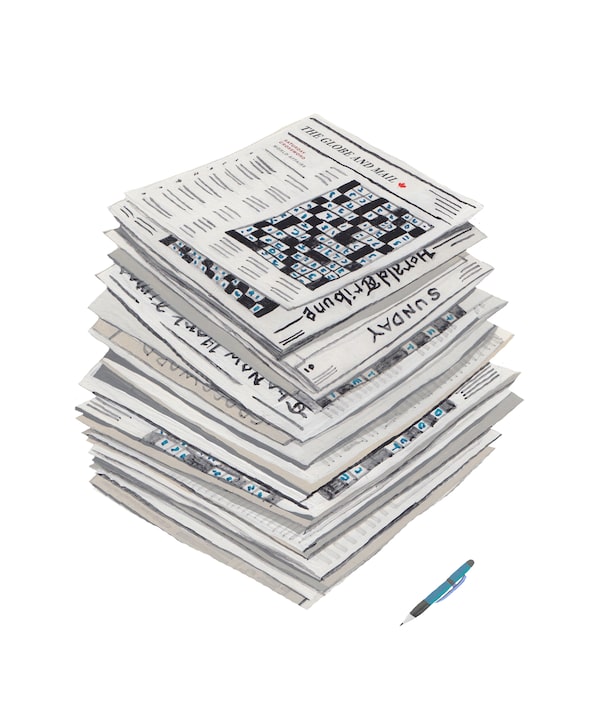
Andrew Watch/The Globe and Mail
First Person is a daily personal piece submitted by readers. Have a story to tell? See our guidelines at tgam.ca/essayguide.
Life is full of puzzles that are impossible to solve, so why not try one that always has a solution?
I have been a crossword enthusiast for more than 40 years. While I might never figure out why a work colleague has stabbed me in the back, or where my socks disappear to in the dryer, when I’m racking my brains to think of a four-letter word that means rumbo and starts with g, at least I know the answer exists. And if I think hard enough, I might even be able to come up with it myself.
A good crossword can drive you crazy, yet keep you entertained for hours at a time. And although it won’t help you solve life’s woes, it can help take your mind off them.
I first became hooked as a graduate student in Paris, desperate for an escape from the grind of writing a master’s thesis in French. This was well before the internet and I did not have a television or even a radio for distraction. I eagerly devoured the second-hand novels that I would purchase at Shakespeare and Company, the iconic English-language bookstore on the Left Bank, and spent many evenings watching old black and white American films in one of the tiny art-house cinemas that seemed to be everywhere in Paris at the time.
But the best distraction by far was the daily New York Times crossword, which was featured in the now defunct English-language International Herald Tribune. What began as a harmless diversion rapidly escalated into a full-blown habit. Before long, I began to live for the weekend edition of the Tribune, which contained the Sunday Times crossword, a mammoth puzzle that is still widely considered to be the ne plus ultra of crosswords and could easily suck up a good 24 hours.
When I returned to Canada, I kept up the habit. My addiction has lasted longer than I have lived anywhere or held any job and predates several of my most enduring close relationships. By now, I have spent well over 10,000 hours on crosswords, the amount of time it is said you need to devote to a skill in order to master it. By that measure, I should be a crossword whiz, able to whip through the toughest puzzle with ease.
Although I have improved somewhat over the years, I have little else to show for my time. All I have learned are some obscure words and seldom-used Latin phrases, along with stray bits of trivia from ancient mythology. Interesting scraps of knowledge that are useful only for solving crossword puzzles and only if you can remember any of them, which I rarely do. Had I devoted half as much time and effort to other pursuits, who knows? I might have mastered jazz piano, become a passable salsa dancer and picked up enough Italian to order a latte in Rome.
No wonder crossword aficionados sometimes get a bad rap; we are hopeless idlers who have nothing better to do. A classic example is Bertie Wooster, in the hilarious novels by P.G. Wodehouse about the dim-witted Englishman and his unflappable valet Jeeves. Bertie, a member of the idle rich, typically spends the better part of his morning doing a puzzle while soaking in the tub and manages to finish it only with the help of the far more intelligent Jeeves.
Fiction also offers crossword aficionados such as Chief Inspector Morse, the brooding, acerbic supersleuth in the detective novels by Colin Dexter, which were made into a popular television series. The Oxford-educated Morse likes to work on crossword puzzles while listening to opera. Real-life crossword practitioners of note include former U.S. president Bill Clinton, who’s reported to be a fan of the Sunday Times puzzle, Broadway composer Stephen Sondheim and the British scientist Alan Turing, who cracked the Nazi’s Enigma Code during the Second World War.
Eventually, I lost interest in regular crosswords and migrated to cryptics. Unlike regular crosswords, which are based primarily on general knowledge and vocabulary, cryptics are based mainly on a seemingly impenetrable system of arcane codes. To solve the puzzle, you must learn how to decode the clues, an activity that I find endlessly entertaining. For many years, my puzzle of choice has been the Saturday cryptic in The Globe and Mail, which appears only once a week, making it easier to keep my habit in check.
During the Second World War, a cryptic puzzle was used on the sly in a crossword contest to vet potential employees for Alan Turing’s top secret Enigma Code Project. Contestants who solved the puzzle in 12 minutes or less were invited to apply for a job. The original puzzle is available on the internet and a friend sent me the link. I was able to solve it, but only after putting in a week of solid effort and – full disclosure – cheating on some of the answers.
Back when I began doing crosswords, if you wanted to cheat, you usually had to pour over a thesaurus, a dictionary, an atlas, or some other reference tome, a task that could be so laborious it felt more like researching than cheating. Today, if you’re stumped by a clue, you can type it into Google. So, if you can’t rest until you find a four letter word for rumbo that starts with g, go ahead and Google it. That’s what I did and now I can get on with my life. At least, until the next puzzle.
Sheila Rosenberg lives in Toronto.